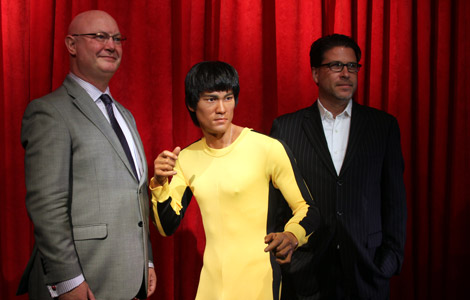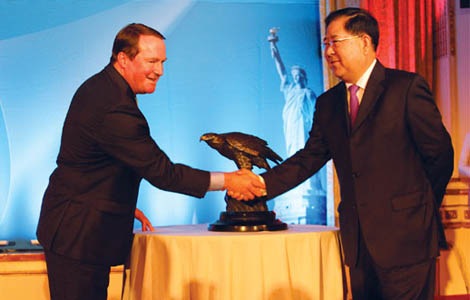Xiaomi is ready to take on smartphone giants in Brazil
Updated: 2014-08-18 04:56
By Ji Ye in Rio de Janeiro(China Daily Latin America)
|
||||||||
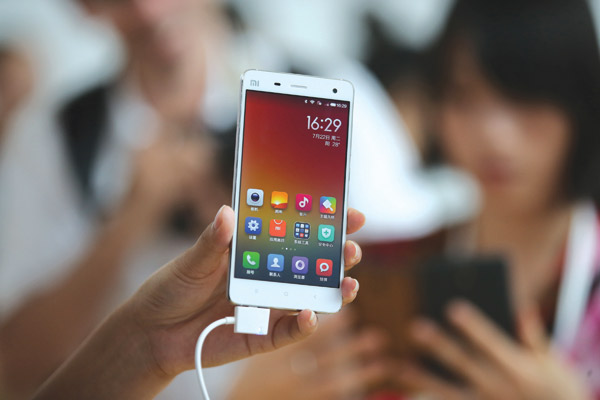 |
|
Xiaomi released its new phone Mi 4 in Beijing on July 22. Wang Jing / China Daily |
Chinese smartphone maker Xiaomi, sometimes called the "Apple from China", is heading for Brazil, opening its first office in Sao Paulo on Aug 6 to begin operations in one of the largest consumer markets in Latin America.
Xiaomi, which means "little rice" in Chinese, has created a buzz in China for selling high-end smartphones that are priced close to cost. Its other products, including tablet computers, routers and television sets, are also popular.
In May, the company showed its determination to take on Apple and Samsung in the global smartphone market by revealing international expansion plans that will target 10 other countries and regions including Brazil.
Xiaomi President and co-founder Lin Bin told Bloomberg News that this is a move which could potentially shake up the global smartphone market.
Xiaomi last year signed Brazilian Hugo Barra, a former vice-president of Google, as global operations vice-president, and has in recent months made its products available in Singapore, Malaysia and the Philippines. In late July, it launched its latest smartphone in India which sold out quickly.
Xiaomi registered in Brazil in May under the name Xiaomi Technology Brazil Ltd. The new office is in Vila Olimpia, south of Sao Paulo. Despite the start of the operations, there will be a delay in releasing a start date for Xiaomi’s products in Brazil.
"It is a difficult time for the entry of new manufacturers of smartphones in Brazil because the Brazilian is very sensitive to the brand," an anonymous market analyst was quoted as saying in the Brazilian news hub Veja.com.
In addition, Xiaomi may have difficulty in adjusting their business model to Brazil. "It is not easy to understand the rules to get government tax incentives for local manufacturing," another source close to the manufacturers in the industry said to Veja.com.
Barra said in an interview with the Wall Street Journal that the delay is due to a "long and painful device-certification process”.
Smartphone makers need to get their products certified by government agencies across the world before they can launch and sell in different markets. In Brazil, the process can take as long as six months to meet local standards and get products certified for sale, he explained.
Barra said Xiaomi's plans to offer its smartphones in Brazil could take longer, citing local laws that require companies like Xiaomi to assemble their products in the South American country. "It may take a long time, probably within the next 12 months, but it’s hard to say," Barra said.
However, Xiaomi's high-end and lower priced smartphones could be a hit in the currently bullish local market. Last year, smartphone sales in Brazil rose by 101 percent, according to analysts. But the country’s tele-density is still low and so is smartphone ownership, which provides a large potential market for Xiaomi.
Barra said that Xiaomi will also use the same competitive pricing strategy that it uses in China when it launches products in foreign markets like Brazil.
Xiaomi has enjoyed unexpected rapid growth since it was founded in 2010. Part of its success is due to its competitive pricing strategy, as its products usually cost half of the price of the products of Samsung and Apple while sharing almost the same hardware.
The company recently unveiled its latest flagship product, Mi 4, with the claim that it’s the fastest smartphone on the planet. The basic version of the product is on sale in China for 1,999 yuan ($325), about half the price of Apple's iPhone.
The smartphone of the Mi 4 is equipped with a 5-inch screen that features HD resolution, an 801 Snapdragon 2.5 GHz processor with four cores, 3 GB of RAM, plus a 13-megapixel rear camera and an 8-megapixel front camera -- the latter’s pixel is more than what is found in Apple and Samsung products.
Besides, Xiaomi provided a variety of completely customizable products, meaning you can buy different back covers and extra batteries. The company also offers services like mobile applications and movies via its software and earns money by selling an array of accessories.
In early 2013, Xiaomi was the 14th in the global ranking for smartphone sales. In just one year, the situation has changed as the company entered the top 10 in the global rankings, ahead of giants like Motorola, Nokia and Sony Mobile.
Xiaomi sells its phones mostly in small batches online but hopes to grow, with plans to sell 60 million smartphones this year. In the first quarter of 2014, it sold 26.11 million phones, a year-on-year increase of 271 percent.
Lei Jun, Xiaomi's other co-founder and CEO, has also set a goal of increasing sales to 100 million phones in 2015, according to an April report from Bloomberg News.
For China Daily
Contact the writer at readers@chinadailyusa.com

 Brazil-China a 'model' to copy
Brazil-China a 'model' to copy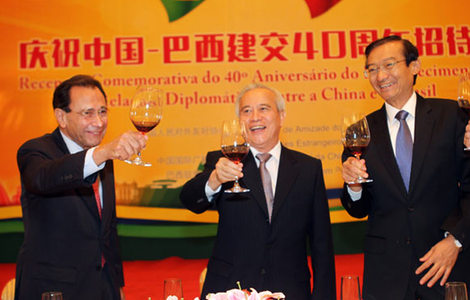
 Unique relation needs further tightening
Unique relation needs further tightening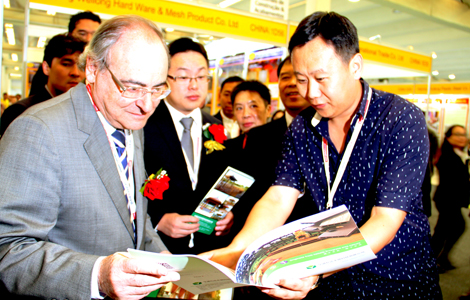
 Trade shows help Chinese firms to gain a foothold in Brazil
Trade shows help Chinese firms to gain a foothold in Brazil
 First lady tours museum with wives of foreign leaders
First lady tours museum with wives of foreign leaders
 Passenger transport starts on Tibet's new railway
Passenger transport starts on Tibet's new railway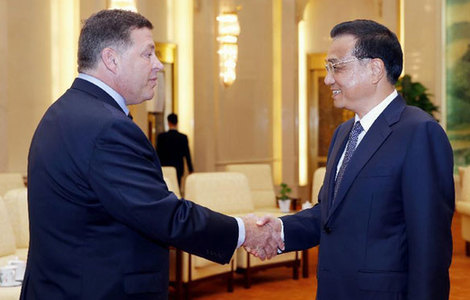
 China to help upgrade US transport network
China to help upgrade US transport network
 Youth Olympic Games kick off in Nanjing
Youth Olympic Games kick off in Nanjing
 Earthquake relief
Earthquake relief
Most Viewed
Editor's Picks

|

|

|

|

|

|
Today's Top News
190,000 people in HK turn up for anti-Occupy march
Ebola outbreak interrupts Chinese companies in Liberia
Macao's Chui unveils political platform for chief executive election
Gov declares emergency, imposes curfew in Ferguson
APEC sets ball rolling for free trade
China's holdings of US securities take a slight dip
China seeks to conduct dialogue with Vatican
China opposes Japan PM's offering to Yasukuni Shrine
US Weekly

|

|
